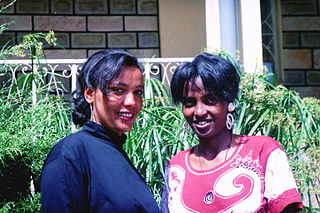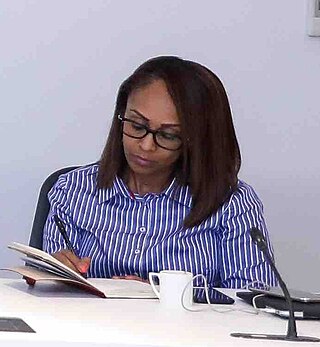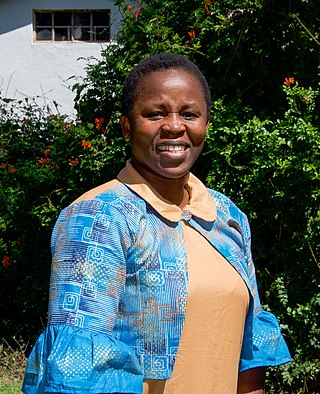Related Research Articles

The United Nations Economic Commission for Africa was established in 1958 by the United Nations Economic and Social Council to encourage economic cooperation among its member states following a recommendation of the United Nations General Assembly. It is one of five regional commissions.
Womankind Worldwide is a UK-based, feminist global women's rights organisation that works in solidarity with women's movements around the world to bring about lasting change in women's lives. Founded in 1989, Womankind partners with women's movements in Africa and Asia to support them in their efforts to change discriminatory laws and policies, challenge gender norms and stereotypes, and provide transformative programmes and services to women and girls.

There have been several studies concerning women in Ethiopia. Historically, elite women in Ethiopia have been visible as administrators and warriors. This never translated into any benefit to improve the rights of women, but it had meant that women could inherit and own property and act as advisors on important communal matters. As late as the first part of the 20th century, Queen Menen, consort of Emperor Iyasu IV, had a decisive role in running the Ethiopian Empire. Workit and Mestayit regents to their minor sons have been held responsible for their provinces. They owed their rights to landed property because of a special type of land tenure that expected tenants to serve as militia to overlords, irrespective of gender. In 1896, Empress Tayetu Betul, wife of Emperor Menelik II, actively advised the government and participated in defending the country from Italian invasion. Prominent and other landowning women fought against the second invasion in 1935–41. With the assistance of European advisors, women in the ensuing period were kept out of the army and politics, even as advisors. Instead, they were restricted to family and household work of raising children and cooking. With a steady increase in female representation in education, they have started to undertake nursing, teaching, and other similarly supportive roles. Over the 2018–2019 period, their gradual participation in state politics has been increasing at a steady pace.
The United Nations Entity for Gender Equality and the Empowerment of Women, also known as UN Women, is a United Nations entity charged with working for gender equality and the empowerment of women. UN Women is charged with advocating for the rights of women and girls, and focusing on a number of issues, including violence against women and violence against LGBT people.

Winifred Byanyima, is a Ugandan aeronautical engineer, politician, human rights activist, feminist and diplomat. She is the executive director of UNAIDS, effective November 2019.

FEMNET, also called the African Women's Development and Communication Network, is an organization established in 1988 to promote women's development in Africa. FEMNET helps non-government organizations share information and approaches on women's development, equality and other human rights.
Lynne Muthoni Wanyeki is a Kenyan political scientist, human rights activist, journalist, and the current Regional Director of Open Society Foundation's Africa Regional Office. Wanyeki is the former Regional Director of Amnesty International's Regional Office for East Africa, the Horn, and the Great Lakes. She is also the former Executive Director of the Kenya Human Rights Commission and the African Women's Development and Communication Network (FEMNET).

Sahle-Work Zewde is an Ethiopian politician and diplomat who is the president of Ethiopia since 2018, being the first woman to hold the office. She was elected as president unanimously by members of the Federal Parliamentary Assembly on 25 October 2018.
Women Political Leaders (WPL) is a non-profit foundation that operates as a global network of female political leaders at national level, including the European Parliament, of whom there are currently around 9,000. WPL provides a platform for the exchange of ideas, experiences and best practices between female political leaders who push for positive change for the world.

Vera Songwe is an economist and banking executive from Cameroon who worked for the World Bank from 1998-2015, and in 2015-2017 served as Western and Central Africa's regional director for the International Finance Corporation. She was the first woman to head the U.N.'s Economic Commission for Africa (ECA) at the level of Under Secretary-General. Songwe currently serves as a non-resident Senior Fellow at the Brookings Institution's Africa Growth Initiative.

Meaza Ashenafi is an Ethiopian lawyer. In November 2018, she was appointed by the Federal Parliamentary Assembly as President of the Federal Supreme Court of Ethiopia until her resignation on 17 January 2023.
As of 2018, the African country Rwanda ranks in the top five countries for gender equality according to the Global Gender Gap Report. The idea of fairness that dominates this country arose after the genocide against the Tutsi that occurred in 1994. The government is committed to ensuring equal rights for women and men without prejudice to the principles of gender equality and complementarity in national development. These ideas are exhibited through the roles of Rwanda women in government, the respect for women's education and the role of women in Rwanda healthcare. The country also took an active stance against rape in genocide, created a national action plan after United Nations Resolution 1325, and is pushing towards ending gender-based violence.
Stellah Wairimu Bosire, is a Kenyan physician, corporate executive, human rights activist and author, a former co-executive director of Uhai Eashri and previously served as the chief executive officer of Kenya Medical Association and as the vice-chair of the HIV and AIDS Tribunal of Kenya.

Professor Senait Fisseha is an Ethio-American physician, lawyer and obstetrician-gynecologist, with a specialization in endocrinology from the University of Michigan. She is currently Vice-President of International Programs at the Susan Thompson Buffet Foundation. Fisseha also received her Juris Doctor from Southern Illinois University and is recognized for her advocacy in global reproductive health, rights and gender equality. During the Covid-19 pandemic, she became an advocate for global equity, collaborating closely with African leaders and institutions in her capacity as an advisor and thought leader. Fisseha is the founder of the Center for International Reproductive Health Training (CIRHT) at the University of Michigan. She also chaired the election campaign and transition of Tedros Adhanom, the first African Director General of the World Health Organization, in 2016-17.

Billene Seyoum Woldeyes is an Ethiopian politician, poet, author and feminist who is serving as the Foreign Press Secretary for the Office of Prime Minister of Ethiopia since 2018. Billene speaks as the prime minister's foreign spokesperson in English.

Dato' Seri Paduka Maimunah binti Mohd Sharif is the Executive Director of the United Nations Human Settlements Programme (UN-Habitat). She assumed office in January 2018, becoming the first Asian woman to serve as Executive Director of UN-Habitat. On 20 January 2022, she was re-elected by the UN General Assembly for a two-year term that ends on 19 January 2024.
Christine Muhongayire is a Rwandan politician, currently a member of the Chamber of Deputies in the Parliament of Rwanda.
Grace Lolim is a Kenyan human rights and peace activist, the chair of the Isiolo Peace Committee, and the founder and executive director of Isiolo Gender Watch.
Zenebework Tadesse is an Ethiopian sociologist and activist. She is the first executive director of AAWORD.

Tapiwa Nyasulu-Rweyemamu, is a Malawian diplomat, Social Scientist, women-rights activist, anti-corruption activist and academic. Tapiwa currently leads Women and Gender Policy and Development at the African Union. Before joining the African Union, Tapiwa was Regional Advisor for Southern Africa at Transparency International where she managed and implemented the Africa Regional Anti-Corruption Programme.
References
- ↑ Jina Moore, Global leadership: In Rwanda, women run the show, The Christian Science Monitor , 13 November 2010. Accessed 10 May 2020.
- 1 2 Meet Ms Memory Kachambwa, the new FEMNET's Executive Director, The Standard , 26 June 2018. Accessed 10 May 2020.
- ↑ Swanee Hunt, Women in Post-genocide Rwanda Have Helped Heal Their Country, National Geographic , 4 April 2014. Accessed 10 May 2020.
- ↑ Tanzania president says teen mothers should quit school, News24 , 23 June 2017. Accessed 10 May 2020.
- ↑ Tanzania president's remarks on teen mothers sparks anger, Daily Nation , 24 June 2017. Accessed 10 May 2020.
- ↑ Women meeting to kick off in Addis Ababa, Daily Nation, 16 February 2018. Accessed 10 May 2020.
- ↑ Crystal Simeoni, When it comes to development, Public Private Partnerships give us a lot to wonder about, 4 October 2019. Accessed 10 May 2020.
- ↑ Mildred Ngesa, Africa CDC and AU must offer dignified, inclusive focus on women & girls in COVID-19 response, Citizen TV, 25 April 2020. Accessed 10 May 2020.